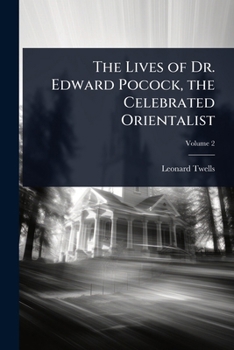The Lives of Dr. Edward Pocock, the Celebrated Orientalist
The Lives of Dr. Edward Pocock, the Celebrated Orientalist, Volume 2, by Leonard Twells, offers a detailed biographical account of the life and work of Edward Pocock (1604-1691), a prominent English Orientalist and scholar. This volume continues to explore Pocock's contributions to Middle Eastern studies, his extensive travels, and his profound impact on the understanding of Arabic and Hebrew languages and cultures in 17th-century Europe.
Twells meticulously documents Pocock's academic pursuits, his interactions with notable figures, and his lasting legacy as a pioneering figure in Oriental studies. This biography provides invaluable insights into the intellectual and religious landscape of Pocock's era, appealing to scholars and readers interested in the history of Orientalism, religious studies, and the cultural exchanges between Europe and the Middle East. It remains a vital resource for understanding the development of Middle Eastern scholarship and the life of one of its key figures.
This work has been selected by scholars as being culturally important, and is part of the knowledge base of civilization as we know it. This work was reproduced from the original artifact, and remains as true to the original work as possible. Therefore, you will see the original copyright references, library stamps (as most of these works have been housed in our most important libraries around the world), and other notations in the work.
This work is in the public domain in the United States of America, and possibly other nations. Within the United States, you may freely copy and distribute this work, as no entity (individual or corporate) has a copyright on the body of the work.
As a reproduction of a historical artifact, this work may contain missing or blurred pages, poor pictures, errant marks, etc. Scholars believe, and we concur, that this work is important enough to be preserved, reproduced, and made generally available to the public. We appreciate your support of the preservation process, and thank you for being an important part of keeping this knowledge alive and relevant.





